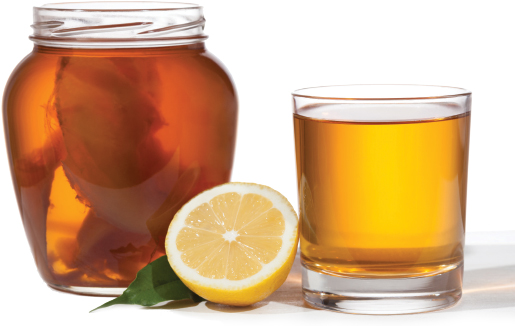The ASCO Post’s Integrative Oncology series is intended to facilitate the availability of evidence-based information on integrative and complementary therapies sometimes used by patients with cancer. Shelly Latte-Naor, MD, and Jyothirmai Gubili, MS, explore some of the beneficial effects attributed to probiotics, the use of which has become more popular worldwide as of late, although the overall supporting evidence is limited, and larger studies are needed.

Shelly Latte-Naor, MD

Jyothirmai Gubili, MS
Overview
PROBIOTICS ARE live microorganisms that are believed to confer health benefits by modulating the gut flora, potentially improving digestion and immune function. They have become popular worldwide over the past 2 decades, yet they have been part of traditional diets for centuries. Culinary sources of probiotics include cultured milk products, such as yogurt and fermented foods, such as kombucha (fermented sweetened black or green tea). They are also available in the form of dietary supplements.
Current clinical data indicate the utility of probiotics in alleviating acute infectious diarrhea, antibiotic-associated diarrhea, and mild-to-moderate ulcerative colitis. They may also play a role in cancer care, as emerging evidence sheds light on how intestinal microbiota influence the outcome of anti–programmed cell death protein 1 immunotherapy in patients with cancer.1
The Science
MANY PROBIOTICS in current use contain nonpathogenic, lactic acid–producing bacteria, including Lactobacillus, Streptococcus, Bifidobacterium, Propionibacterium, and Enterococcus, or yeasts such as Saccharomyces boulardii.
Systematic reviews and meta-analyses indicate that oral probiotics help reduce acute infectious diarrhea [34% reduction],2 antibiotic-associated diarrhea [relative risk = 0.58],3 and recurrent abdominal pain in children [pain frequency P = .012; pain intensity P = .005].4 Benefits have also been reported for the treatment of mild to moderately active ulcerative colitis, with sustained remissions [relative risk = 0.74].5
In addition, preliminary findings suggest the utility of probiotics in lowering high blood pressure6 and cholesterol,7 for bacterial vaginosis,8 and for eczema in infants.9 As the role of the gut microbiome has increasingly been implicated in metabolic disorders,10 probiotics are also being researched as possible treatment options. Experiments in murine models and small clinical studies have shown the positive effects of probiotic supplementation against obesity and diabetes.11

Probiotics may play a part in preventing carcinogenesis as well. An epidemiologic study reported an inverse association between the consumption of unpasteurized dairy products and incidence of colorectal cancer.12 And a systematic review of 11 studies (n = 1,557) found probiotic supplementation to be effective in reducing the severity and frequency of cancer treatment–associated diarrhea and the need for antidiarrheal medication.13 In addition, perioperative administration of probiotics resulted in fewer surgical-site infections [n = 156; P = .016]14 and improved bowel function [n = 60; P = .0268]15 in randomized studies of patients undergoing colorectal surgery.
Probiotics are thought to exert their salutary effects by reversing dysbiosis—changes in the composition or function of gut microbes associated with several chronic and degenerative diseases. Proposed mechanisms include the production of compounds that inhibit the growth of pathogenic microorganisms, along with the production of substrates to facilitate the growth of beneficial bacteria. They may also influence changes in microbiota via their interactions with the mucosal system, thereby affecting systemic immunity, and by facilitating reduction in proinflammatory markers associated with many disorders.11,16 A study conducted in a murine model of melanoma suggested that manipulating the microbiota may modulate cancer immunotherapy, by enhancing antitumor immunity in vivo through administering a Bifidobacterium strain.17
Interestingly, a single probiotic can have different effects in a population. Genes that respond to probiotic intake were found to be strain-specific18 and to cluster based on the individual, not the intervention.18,19
Additional strategies being researched to modulate gut bacteria include prebiotics and fecal microbiota transplantation. Prebiotics, such as fructans, inulin, and lactulose, are nondigestible compounds that selectively facilitate the growth or activity of useful gut bacteria. Because probiotics are short-lived, prebiotics can be coadministered to maintain their levels in the gut. The combination is referred to as “synbiotic therapy” and was found to be useful for managing irritable bowel syndrome.20 When used as an adjunctive treatment, it can also help prevent postoperative complications among adult surgical patients by reducing skin and soft-tissue infections, pneumonia, sepsis, hospital stay, and antibiotic use.21
Fecal microbiota transplantation entails administering fecal matter from a healthy donor into a recipient. Current evidence to support its use in the treatment of Clostridium difficile infection is limited.22,23

Jun J. Mao, MD, MSCE
It is important to note, however, that despite probiotic supplementation, gut colonization is not always achieved.24 In another study that examined postantibiotic recovery in humans, administration of probiotics was associated with a delay in gut-microbiome reconstitution.25
Adverse Reactions
BACTEREMIA IN preterm infants,26,27 a newborn,28 and a 17-year old with ulcerative colitis29; probiotic-associated pneumonia in an 11-month-old baby30; and D-lactic acid encephalopathy in a 5-year-old child31 have been reported with the use of probiotics.
GUEST EDITOR
Integrative Oncology is guest edited by Jun J. Mao, MD, MSCE, Laurance S. Rockefeller Chair in Integrative Medicine and Chief, Integrative Medicine Service, Memorial Sloan Kettering Cancer Center, New York.Fungemia in patients with C difficile–associated diarrhea32,33; sepsis in a patient with extensive burns34 and in a patient after aortic valve replacement35; Lactobacillus empyema in a lung-transplant recipient with AIDS36; bacteremia in a patient with AIDS and Hodgkin lymphoma37; and bloodstream infection in a critically ill patient with acute pancreatitis38 have all been reported with the use of probiotics.
However, some studies have reported that probiotic use was safe in recipients of solid organ transplants and other immunocompromised hosts, and it was not associated with any systemic infections.39-41
Contraindications
PROBIOTICS CONTAINING S boulardii should not be taken by critically ill patients, those who are immunocompromised, and those with a central venous catheter.42
Newborns with a very low weight, clinical instability, and umbilical catheters as well as those with congenital abnormalities or stage III asphyxia should not be administered probiotics.43
Herb-Drug Interactions
HEPATIC DRUG-METABOLIZING ENZYMES: VSL 3, a probiotic formulation of eight bacterial strains, was found to alter the expression of Cyp4v3, alcohol dehydrogenase 1, carboxylesterase 2a, and multiple phase II glutathione-S-transferases in a murine model.44 Clinical relevance has yet to be determined.
For specific recommendations, the U.S. edition of the Clinical Guide for Probiotic Products, an online database, provides information and corresponding research studies supporting the use of specific probiotic strains.45 However, the guide is not meant to be interpreted as a “clinical practice guideline,” nor does it endorse companies to market health claims.
Summary
ALTHOUGH BENEFICIAL effects have been attributed to probiotics, the overall evidence is limited due to poor methodology, small sample size, variation in the species and strains of bacteria used, and also the dosage and duration of administration. Larger studies on the use of probiotics are needed. ■
Dr. Latte-Naor is Director, Mind-Body Medicine, and Assistant Attending Physician, Integrative Medicine Service, Memorial Sloan Kettering Cancer Center, New York. Ms. Gubili is Editor, Integrative Medicine Service, Memorial Sloan Kettering Cancer Center, New York.
DISCLOSURE: Dr. Latte-Naor and Ms. Gubili reported no conflicts of interest.
REFERENCES
1. York A: Microbiome: Gut microbiota sways response to cancer immunotherapy. Nat Rev Microbiol 16:121, 2018.
2. Sazawal S, Hiremath G, Dhingra U, et al: Efficacy of probiotics in prevention of acute diarrhoea: A meta-analysis of masked, randomised, placebo-controlled trials. Lancet Infect Dis 6:374-382, 2006.
3. Hempel S, Newberry SJ, Maher AR, et al: Probiotics for the prevention and treatment of antibiotic-associated diarrhea: A systematic review and meta-analysis. JAMA 307:1959-1969, 2012.
4. Newlove-Delgado TV, Martin AE, Abbott RA, et al: Dietary interventions for recurrent abdominal pain in childhood. Cochrane Database Syst Rev 3:CD010972, 2017.
5. Derwa Y, Gracie DJ, Hamlin PJ, et al: Systematic review with meta-analysis: The efficacy of probiotics in inflammatory bowel disease. Aliment Pharmacol Ther 46:389-400, 2017.
6. Nikbakht E, Khalesi S, Singh I, et al: Effect of probiotics and synbiotics on blood glucose: A systematic review and meta-analysis of controlled trials. Eur J Nutr 57:95-106, 2018.
7. Agerholm-Larsen L, Bell ML, Grunwald GK, et al: The effect of a probiotic milk product on plasma cholesterol: A meta-analysis of short-term intervention studies. Eur J Clin Nutr 54:856-860, 2000.
8. Reid G, Burton J, Hammond JA, et al: Nucleic acid-based diagnosis of bacterial vaginosis and improved management using probiotic lactobacilli. J Med Food 7:223-228, 2004.
9. Cuello-Garcia CA, Brożek JL, Fiocchi A, et al. Probiotics for the prevention of allergy: A systematic review and meta-analysis of randomized controlled trials. J Allergy Clin Immunol 136:952-961, 2015.
10. Hur KY, Lee MS: Gut microbiota and metabolic disorders. Diabetes Metab J 39:198-203, 2015.
11. Thomas LV, Suzuki K, Zhao J: Probiotics: A proactive approach to health: A symposium report. Br J Nutr 114(suppl 1):S1-S15, 2015.
12. Campbell TC: A study on diet, nutrition and disease in the People’s Republic of China: Part I. Bol Asoc Med P R 82:132- 134, 1990.
13. Redman MG, Ward EJ, Phillips RS: The efficacy and safety of probiotics in people with cancer: A systematic review. Ann Oncol 25:1919-1929, 2014.
14. Aisu N, Tanimura S, Yamashita Y, et al: Impact of perioperative probiotic treatment for surgical site infections in patients with colorectal cancer. Exp Ther Med 10:966-972, 2015.
15. Yang Y, Xia Y, Chen H, et al: The effect of perioperative probiotics treatment for colorectal cancer: Short-term outcomes of a randomized controlled trial. Oncotarget 7:8432-8440, 2016.
16. Sanders ME: Impact of probiotics on colonizing microbiota of the gut. J Clin Gastroenterol 45(suppl):S115-S119, 2011.
17. Sivan A, Corrales L, Hubert N, et al: Commensal Bifidobacterium promotes antitumor immunity and facilitates anti-PD-L1 efficacy. Science 350:1084-1089, 2015.
18. van Baarlen P, Troost F, van der Meer C, et al: Human mucosal in vivo transcriptome responses to three lactobacilli indicate how probiotics may modulate human cellular pathways. Proc Natl Acad Sci U S A 108(suppl 1):4562-4569, 2011.
19. Bron PA, van Baarlen P, Kleerebezem M: Emerging molecular insights into the interaction between probiotics and the host intestinal mucosa. Nat Rev Microbiol 10:66-78, 2012.
20. Bittner AC, Croffut RM, Stranahan MC: Prescript-assist probiotic-prebiotic treatment for irritable bowel syndrome: A methodologically oriented, 2-week, randomized, placebo-controlled, double-blind clinical study. Clin Ther 27:755-761, 2005.
21. Kasatpibal N, Whitney JD, Saokaew S, et al: Effectiveness of probiotic, prebiotic, and synbiotic therapies in reducing postoperative complications: A systematic review and network meta-analysis. Clin Infect Dis 64(suppl 2):S153-S160, 2017.
22. Webb BJ, Brunner A, Ford CD et al: Fecal microbiota transplantation for recurrent Clostridium difficile infection in hematopoietic stem cell transplant recipients. Transpl Infect Dis 18:628-633, 2016.
23. Konturek PC, Koziel J, Dieterich W, et al: Successful therapy of Clostridium difficile infection with fecal microbiota transplantation. J Physiol Pharmacol 67:859-866, 2016.
24. Zmora N, Zilberman-Schapira G, Suez J, et al: Personalized gut mucosal colonization resistance to empiric probiotics is associated with unique host and microbiome features. Cell 174:1388-1405, 2018.
25. Suez J, Zmora N, Zilberman-Schapira G, et al: Post-antibiotic gut mucosal microbiome reconstitution is impaired by probiotics and improved by autologous FMT. Cell 174:1406- 1423, 2018.
26. Bertelli C, Pillonel T, Torregrossa A, et al: Bifidobacterium longum bacteremia in preterm infants receiving probiotics. Clin Infect 60:924-927, 2015.
27. Jenke A, Ruf EM, Hoppe T, et al: Bifidobacterium septicaemia in an extremely low-birthweight infant under probiotic therapy. Arch Dis Child Fetal Neonatal Ed 97:F217-F218, 2012.
28. Ohishi A, Takahashi S, Ito Y, et al: Bifidobacterium septicemia associated with postoperative probiotic therapy in a neonate with omphalocele. J Pediatr 156:679-681, 2010.
29. Vahabnezhad E, Mochon AB, Wozniak LJ, et al: Lactobacillus bacteremia associated with probiotic use in a pediatric patient with ulcerative colitis. J Clin Gastroenterol 47:437- 439, 2013.
30. Doern CD, Nguyen ST, Afolabi F, et al: Probiotic-associated aspiration pneumonia due to Lactobacillus rhamnosus. J Clin Microbiol 52:3124-3126, 2014.
31. Munakata S, Arakawa C, Kohira R, et al: A case of D-lactic acid encephalopathy associated with use of probiotics. Brain Dev 32:691-694, 2010.
32. Santino I, Alari A, Bono S, et al: Saccharomyces cerevisiae fungemia, a possible consequence of the treatment of Clostridium difficile colitis with a probioticum. Int J Immunopathol Pharmacol 27:143-146, 2014.
33. Thygesen JB, Glerup H, Tarp B: Saccharomyces boulardii fungemia caused by treatment with a probioticum. BMJ Case Rep March 27, 2012.
34. Stefanatou E, Kompoti M, Paridou A, et al: Probiotic sepsis due to Saccharomyces fungaemia in a critically ill burn patient. Mycoses 54:e643-e646, 2011.
35. Kochan P, Chmielarczyk A, Szymaniak L, et al: Lactobacillus rhamnosus administration causes sepsis in a cardiosurgical patient: Is the time right to revise probiotic safety guidelines? Clin Microbiol Infect 17:1589-1592, 2011.
36. Luong ML, Sareyyupoglu B, Nguyen MH, et al: Lactobacillus probiotic use in cardiothoracic transplant recipients: A link to invasive Lactobacillus infection? Transpl Infect Dis 12:561-564, 2010.
37. Ledoux D, Labombardi VJ, Karter D: Lactobacillus acidophilus bacteraemia after use of a probiotic in a patient with AIDS and Hodgkin’s disease. Int J STD AIDS 17:280-282, 2006.
38. Papanikolaou MN, Balla M, Papavasilopoulou T, et al: Probiotics: An obedient ally or an insidious enemy? Crit Care 16:456, 2012.
39. Rayes N, Seehofer D, Hansen S, et al: Early enteral supply of lactobacillus and fiber versus selective bowel decontamination: A controlled trial in liver transplant recipients. Transplantation 74:123-127, 2002.
40. Rayes N, Seehofer D, Theruvath T, et al: Supply of pre-and probiotics reduces bacterial infection rates after liver transplantation: A randomized, double-blind trial. Am J Transplant 5:125-130, 2005.
41. Saint-Marc T, Rossello-Prats L, Touraine JL: Efficacy of Saccharomyces boulardii in the treatment of diarrhea in AIDS. Ann Med Interne (Paris) 142:64-65, 1991 [article in French].
42. Cohen SH, Gerding DN, Johnson S, et al: Clinical practice guidelines for Clostridium difficile infection in adults: 2010 update by the Society for Healthcare Epidemiology of America (SHEA) and the Infectious Diseases Society of America (IDSA). Infect Control Hosp Epidemiol 31:431-455, 2010.
43. Parker R: Probiotic guideline for necrotizing enterocolitis prevention in very low-birth-weight neonates. Adv Neonatal Care 14:88-95, 2014.
44. Selwyn FP, Cheng SL, Klaassen CD, et al: Regulation of hepatic drug-metabolizing enzymes in germ-free mice by conventionalization and probiotics. Drug Metab Dispos 44:262-274, 2016.
45. Clinical Guide to Probiotic Products Available in USA: Indications, Dosage Forms and Clinical Evidence to Date – 2018 Edition. Available at http://usprobioticguide.com/. Accessed November 5, 2018.

